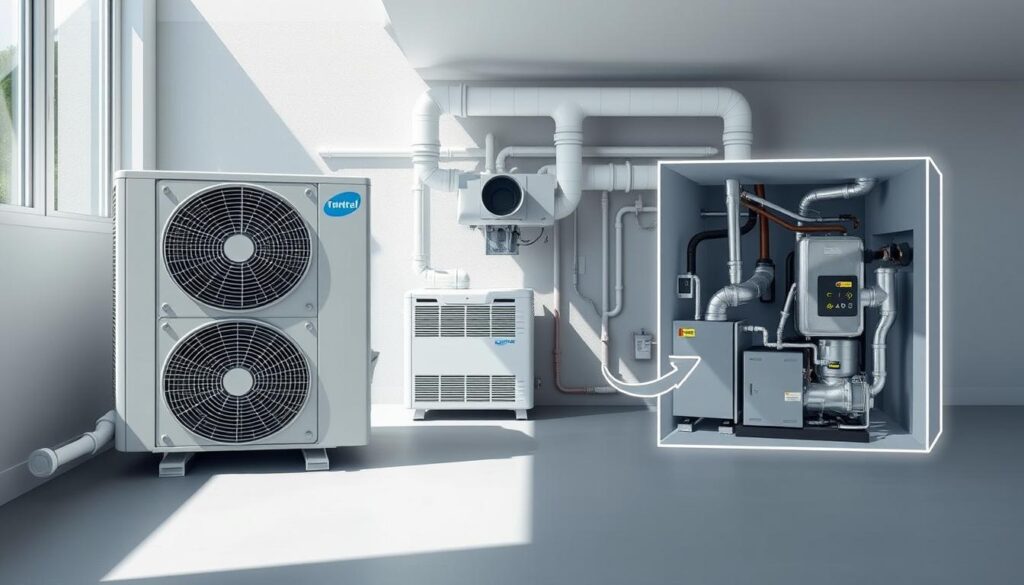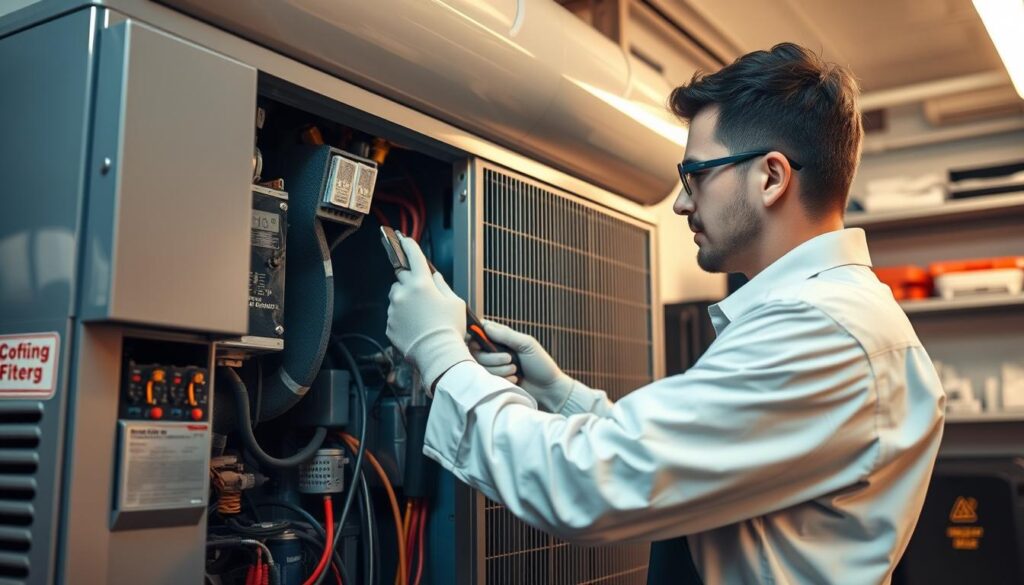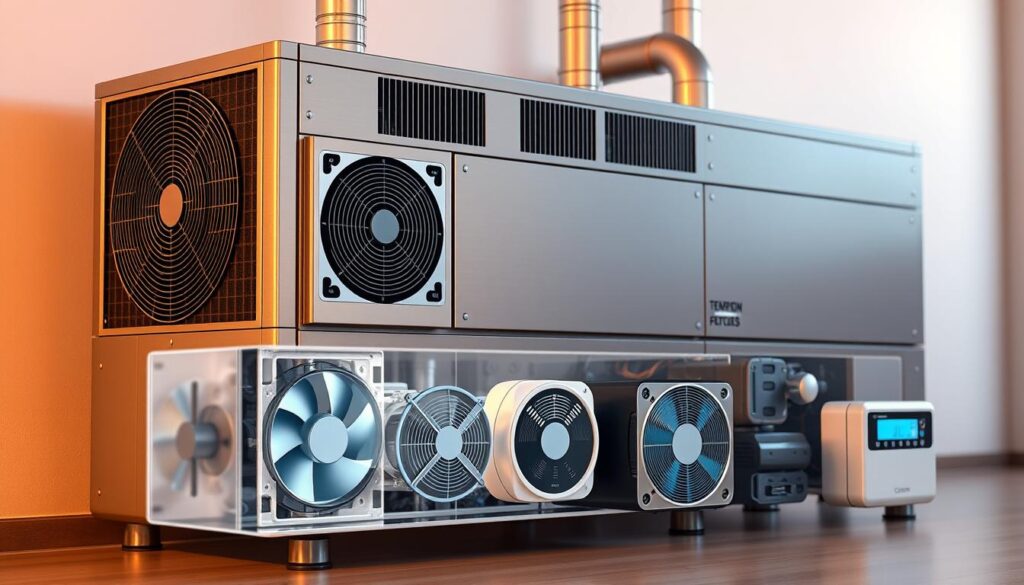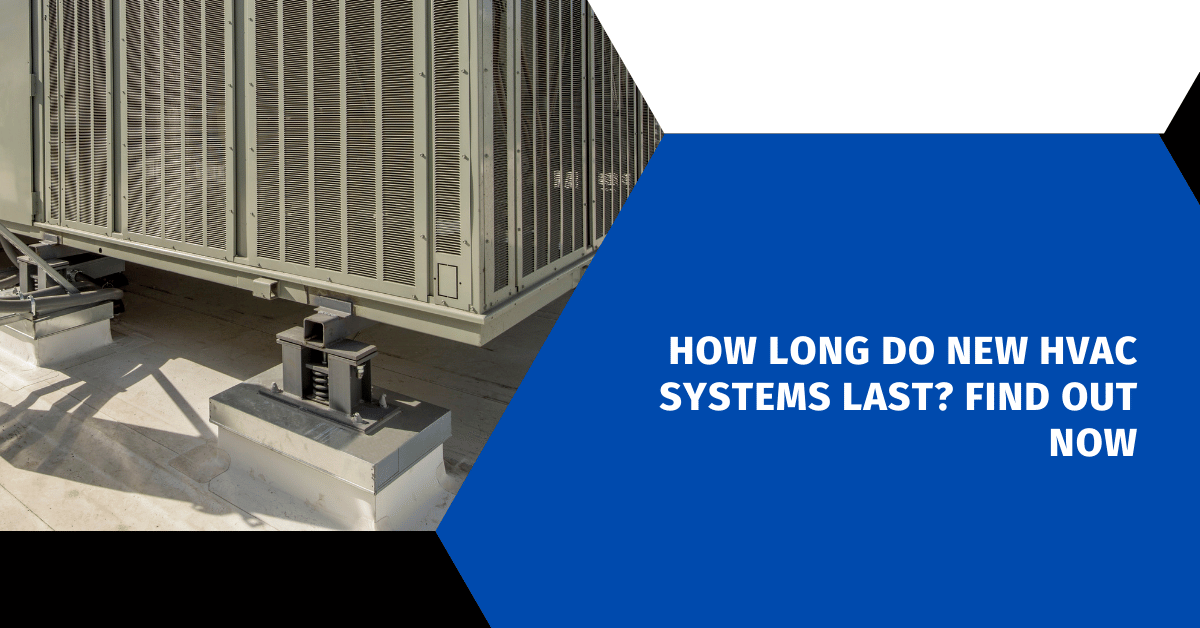Affiliate Disclosure
HVAC Guide Guys is a participant in the Amazon Services LLC Associates Program, an affiliate advertising program designed to provide a means for sites to earn advertising fees by advertising and linking to Amazon.
How Long Do New HVAC Systems Last? Are you curious about how long your home’s HVAC system will keep you cozy? Knowing how long new HVAC systems last is key to planning for the future. It helps you keep your home comfortable for years to come.

Modern HVAC systems usually last between 15 to 25 years. But, several things can affect how long they last. The American Society of Heating, Refrigerating and Air-Conditioning Engineers (ASHRAE) says heat pumps typically last 15 years. Some systems can even last longer with the right care.
It’s important for homeowners to know how long new HVAC systems last. This knowledge helps with home maintenance and budgeting. The lifespan of your HVAC system depends on many factors. These include regular maintenance, the climate, and how well it was installed.
Key Takeaways
- Most HVAC systems last between 15 to 25 years
- Regular maintenance can significantly extend system life
- Climate and environmental conditions impact HVAC lifespan
- Different HVAC components have varying average lifespans
- Energy efficiency plays a role in system longevity
Table of Contents
Understanding HVAC System Fundamentals
Your home’s comfort relies on a complex network of heating, ventilation, and air conditioning (HVAC) systems. These systems work hard to keep your home at the right temperature, control humidity, and ensure good air flow. Knowing how HVAC systems work can help you decide when to replace them and keep them running well.
Modern HVAC systems are advanced machines that keep your home comfortable all year. They have many parts that work together to control the indoor climate.
Types of HVAC Systems
There are different HVAC systems for various homes and climates. The main types are:
- Central Air Conditioning Systems
- Heat Pumps
- Furnace-based Systems
- Ductless Mini-Split Systems
- Geothermal Heat Pumps
Key Components of Modern HVAC Systems
Every HVAC system has important parts for efficient operation:
- Thermostat: Sets the temperature
- Air Handler: Moves conditioned air
- Compressor: Pressurizes refrigerant
- Condenser Coil: Releases heat outside
- Ductwork: Spreads conditioned air
Role of HVAC in Home Comfort
HVAC systems do more than just control temperature. They also improve indoor air quality by removing pollutants and managing humidity. Regular maintenance can make your system last longer and work better for years.
Understanding your HVAC system is key to long-term comfort and energy savings in your home.
Explore Our HVAC Shop
Looking for top-rated HVAC tools, parts, and accessories? Visit our shop and find the perfect solution for your needs.
Visit the ShopAverage Lifespan of Different HVAC Components
Knowing how long different parts of your HVAC system last can help you plan for the future. It ensures your home stays comfortable. Each part has its own lifespan, affecting how long your system works well.
Your HVAC system has many parts, each lasting a different amount of time. Let’s look at how long some key parts are expected to last:
- Central Air Conditioners: 15-20 years
- Gas Furnaces: 15-30 years
- Heat Pumps: 10-15 years (up to 25 years with great care)
- Air Handlers: 15-20 years
- Ductless Mini-Split Systems: 15-20 years
- Thermostats: About 10 years
Things like how often you maintain it, how well it was installed, and your environment play big roles. Getting regular professional checks can really help your HVAC parts last longer.
| HVAC Component | Average Lifespan | Key Considerations |
|---|---|---|
| Central Air Conditioner | 15-20 years | Depends on maintenance and usage |
| Gas Furnace | 15-30 years | Heat exchanger condition critical |
| Heat Pump | 10-15 years | Maintenance can extend life up to 25 years |
Regular maintenance is essential for your HVAC system’s long life. Getting an annual check-up can catch problems early, saving you money on big repairs.
Factors That Impact HVAC System Longevity
Your HVAC system’s lifespan depends on many important factors. Knowing these can help keep your home comfortable and save you money.
The environment around your HVAC system is key to its performance and life. Extreme weather can stress its parts, leading to faster wear and tear.
Climate and Weather Conditions
Different places have unique challenges for HVAC systems. Homes in areas with:
- Extreme heat or cold
- High humidity levels
- Significant dust or debris
Face faster system breakdown. Your local climate affects how hard your HVAC must work to keep your home comfortable.
Maintenance Frequency
Maintenance is vital for your HVAC system. Regular check-ups can make it last longer. Important maintenance steps include:
- Annual professional inspections
- Monthly air filter replacements
- Cleaning external units
- Checking refrigerant levels
Installation Quality
Professional installation is critical for long-term performance. Certified technicians ensure the right size, correct ductwork, and optimal setup. Bad installation can shorten your HVAC’s life by years.
By understanding and tackling these factors, you can extend your system’s life. This can be beyond the usual 10-25 years.
Explore Our HVAC Shop
Looking for top-rated HVAC tools, parts, and accessories? Visit our shop and find the perfect solution for your needs.
Visit the ShopHow Long Do New HVAC Systems Last?
Knowing how long an HVAC system lasts is key for homeowners. Modern systems can last 15 to 20 years with good care.
Different parts of an HVAC system last different lengths of time. This affects how long a new system will last. Here’s a look at what you can expect:
- Central Air Conditioning Units: 15-20 years
- Furnaces: 15-20 years
- Heat Pumps: 10-15 years (up to 25-30 years with great care)
- Electric Furnaces: Can last 40-50 years in the best conditions
“Proper maintenance is the key to maximizing your HVAC system’s lifespan,” says industry expert Mark Thompson.
How long your HVAC system lasts depends on many things. These include how well it was installed, how often it’s maintained, and the local weather. Regular upkeep can really help your system last longer.
| HVAC System Type | Average Lifespan | Maintenance Impact |
|---|---|---|
| Residential Single Whole-Home Unit | 15 years | High importance |
| Ground-Source Heat Pumps | 25-30 years | Critical maintenance needed |
| Window AC Units | 10 years | Moderate maintenance |
Getting a professional to install your system and having it serviced yearly can really help. It keeps your system running well and lasts longer. Always fix problems early to avoid expensive fixes later.
Signs Your HVAC System Needs Replacement
Your HVAC system shows signs of trouble through various warning signs. Knowing these signs helps you decide when to replace it. This can prevent sudden breakdowns.
It’s important to know when your HVAC system needs a new one. This keeps your home comfortable and saves energy over time. Here are some key signs it’s time for a new system:
- Energy bills climbing unexpectedly
- Frequent and costly repairs
- Inconsistent home temperatures
- Age of the existing system
- Unusual noises or odors
Rising Energy Bills: A Red Flag
Unexpected increases in utility costs mean your HVAC system is losing efficiency. Short-cycling can raise energy use by up to 30%. This can significantly increase your monthly bills.
Frequency of Repairs
When repair costs pile up, it’s cheaper to replace your system. The average HVAC repair costs between $150 and $1,500. Annual repair costs can be over $2,000.
| System Age | Repair Cost Threshold | Replacement Recommendation |
|---|---|---|
| 10-15 years | $600 | Consider replacement |
| 15-20 years | $400 | Strongly recommend replacement |
Performance Indicators
Look out for these performance problems:
- Uneven heating or cooling
- Increased humidity levels
- Persistent indoor air quality problems
“If your system is over 15 years old and has many issues, replacing it is often cheaper than fixing it again and again.”
Keeping an eye on your HVAC system’s performance can save you money. Regular maintenance and timely replacement ensure your home stays comfortable and energy-efficient.
Explore Our HVAC Shop
Looking for top-rated HVAC tools, parts, and accessories? Visit our shop and find the perfect solution for your needs.
Visit the ShopMaximizing Your HVAC System’s Lifespan

To make your HVAC system last longer, you need to maintain it well and use it wisely. How you care for your HVAC system affects its lifespan. By following a few important steps, you can make your HVAC system more efficient over time.
Keeping your HVAC system in top shape is key. Here are some vital steps to follow:
- Replace air filters every 60-90 days
- Schedule professional inspections annually
- Keep outdoor units clear of debris
- Maintain consistent thermostat settings
By taking good care of your HVAC system, you can add 5 to 15 years to its life. A clean air filter can boost efficiency by 5% to 15%. This reduces the wear and tear on your system.
| Maintenance Task | Frequency | Potential Benefit |
|---|---|---|
| Air Filter Replacement | Every 60-90 days | Up to 15% efficiency improvement |
| Professional Inspection | Annually | Potential $500 repair savings |
| Duct Sealing | Every 2-3 years | Up to 10% energy cost reduction |
By spending a little time and effort on regular maintenance, you can greatly improve your HVAC system’s performance and lifespan. Proactive care is always more cost-effective than reactive repairs.
Cost Considerations for HVAC Replacement
Understanding the costs of HVAC replacement is key for homeowners. It’s not just about the initial cost. It’s about making your home more comfortable and saving energy in the long run.
Initial Investment vs. Long-term Savings
The cost to replace your HVAC system is between $5,000 and $12,500. Most people spend about $7,500. Even though it’s a big upfront cost, you can save a lot of money later.
“The smartest home improvements balance immediate expenses with future benefits.” – HVAC Industry Expert
- New systems can cut energy use by up to 20%
- Modern units use less electricity, saving you money
- There are tax credits and rebates that can help with the cost
Energy Efficiency Benefits
Choosing a high-efficiency HVAC system means big savings on energy. New systems use less electricity, which means lower bills every month.
| HVAC System Type | Average Cost | Estimated Annual Savings |
|---|---|---|
| Standard Efficiency | $7,500 | $300-$500 |
| High-Efficiency System | $10,000 | $700-$1,000 |
Use the “$5,000 rule” to decide if replacing your system is worth it. If your system is old and repairs cost more than $5,000, a new system is likely a better choice.
Explore Our HVAC Shop
Looking for top-rated HVAC tools, parts, and accessories? Visit our shop and find the perfect solution for your needs.
Visit the ShopModern HVAC Technologies and Lifespans

Modern HVAC technologies are changing how we keep our homes comfortable and energy-efficient. Now, when you think about upgrading your HVAC, you can choose from the latest innovations. These include smart thermostats, variable-speed motors, and high-efficiency heat pumps.
These new technologies bring big benefits to homeowners:
- Heat pumps can cut down on heat energy use by up to 50%
- Smart thermostats can help lower your energy bills by up to 15%
- Variable-speed motors help your HVAC system last longer by reducing wear
The newest HVAC techs make systems last longer by working more precisely and using less. The government is also helping by giving tax credits and rebates for energy-saving upgrades.
| Technology | Efficiency Improvement | Potential Lifespan Extension |
|---|---|---|
| Smart Thermostats | 10-15% Energy Savings | Up to 3 Years |
| Heat Pumps | 50% Heat Energy Reduction | Up to 5 Years |
| Variable-Speed Motors | 5-10% Efficiency Boost | Up to 4 Years |
When you’re looking to upgrade your HVAC, check out these advanced options. Choosing modern systems can greatly improve your home’s comfort and energy use.
Conclusion for How Long Do New HVAC Systems Last?
Knowing how long your HVAC system lasts is key to keeping your home comfy and efficient. Most systems can go 15 to 20 years with the right care. But, how long it lasts can change based on how well you maintain it, how often you use it, and your environment.
Thinking about upgrading your HVAC is important. Regular checks by pros, changing filters on time, and keeping up with maintenance can make your system last longer. This way, you keep your home comfortable and save money on big repairs later.
Deciding to replace your old HVAC system is a big choice. Look out for signs like higher energy bills, lots of repairs, and uneven temperatures. New systems use less energy and can save you a lot of money compared to old ones.
Smart homeowners see their HVAC as a big investment. They make sure to get regular maintenance, keep up with new tech, and know when it’s time for a new system. This way, they keep their homes comfy, save on energy, and make their systems last longer.

